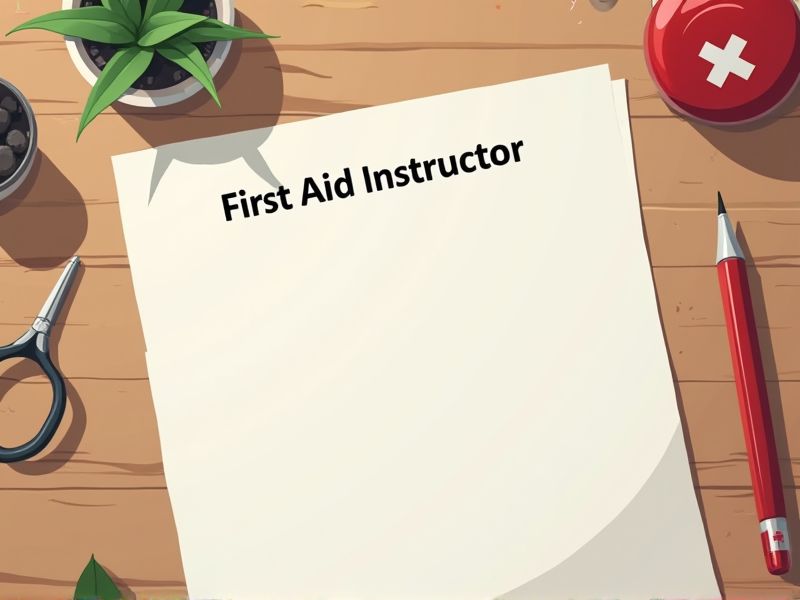
To become a proficient First Aid Instructor, individuals must be equipped with specific certifications that validate their expertise and ability to teach lifesaving skills. These certifications ensure instructors are equipped with the latest knowledge and techniques necessary to handle diverse medical emergencies. Obtaining these qualifications boosts credibility, ensuring that students receive reliable and competent training. Some key certifications you may require as a First Aid Instructor include the following.
American Heart Association First Aid/CPR/AED Instructor Certification
The American Heart Association First Aid/CPR/AED Instructor Certification ensures instructors have validated skills and knowledge to effectively teach life-saving techniques. It provides a standardized framework, aligning instruction with the latest scientific guidelines and best practices. Certified instructors gain credibility and authority, enhancing trust among participants and employers. Certification ensures consistency in training, thereby increasing the likelihood of successful emergency responses.
American Red Cross First Aid/CPR/AED Instructor Certification
Obtaining the American Red Cross First Aid/CPR/AED Instructor Certification ensures that instructors have verified and recognized credentials, which enhances their credibility when teaching first aid. The certification equips instructors with the latest and evidence-based first aid practices, ensuring they disseminate accurate and effective emergency response techniques. Possessing this certification demonstrates an instructor's commitment to maintaining high standards in emergency care training, which can increase trust and participation rates among trainees. The structured curriculum provided by the American Red Cross ensures consistent instruction across different training sessions, leading to a standardized level of competence among those taught.
National Safety Council First Aid Instructor Certification
Training from the National Safety Council (NSC) provides first aid instructors with recognized, expert-level knowledge and skills. This certification enhances their credibility and ensures compliance with safety standards. Instructors gain access to standardized teaching materials that improve the quality of instruction. The certification also facilitates widespread consistency in first aid training across various organizations.
Basic Life Support (BLS) Instructor Certification
Possessing a Basic Life Support (BLS) Instructor Certification equips a First Aid Instructor with critical skills to manage severe emergencies, such as cardiac arrest, which increases the survival rate. The certification ensures that instructors are up-to-date with the latest guidelines and practices, fostering consistent and standardized training for participants. Having BLS credentials enhances the credibility and competency of a First Aid Instructor, raising the overall quality of instruction provided. It also fulfills organizational and regulatory requirements that mandate certified instructors to teach life-saving techniques effectively.
Advanced Cardiac Life Support (ACLS) Instructor Certification
Obtaining an Advanced Cardiac Life Support (ACLS) Instructor Certification equips a First Aid Instructor with the comprehensive skills to manage severe emergencies like cardiac arrest, which are beyond basic first aid. The certification ensures instructors have a deeper understanding of life-saving algorithms and pharmacology related to cardiovascular emergencies, enhancing their teaching effectiveness. This qualification also instills confidence in students, knowing they are learning from someone who meets high standards of cardiac emergency care. Being certified can potentially increase the instructor's professional credibility and open up more career opportunities in health and safety education.
Pediatric Advanced Life Support (PALS) Instructor Certification
First Aid Instructors with PALS certification gain an in-depth understanding of pediatric emergencies, enhancing their ability to teach life-saving techniques for children. A PALS-certified instructor is more equipped to address specific pediatric conditions, which improves the overall quality and comprehensiveness of the training they provide. Certification indicates adherence to standardized procedures and protocols, ensuring that instruction aligns with current medical guidelines. By obtaining this certification, instructors increase their credibility, which can lead to more trust from clients and potentially more opportunities for teaching engagements.
Emergency Medical Technician (EMT) Certification
An EMT Certification provides a solid foundation in medical knowledge, enabling First Aid Instructors to teach accurate and up-to-date techniques. With EMT training, instructors gain practical experience in emergency situations, enhancing their ability to convey critical skills effectively. Employers and learners tend to trust instructors with EMT Certification due to the recognized standard of competency it represents. Legally, some regions require First Aid Instructors to hold EMT Certification to ensure consistent quality in emergency training programs.
Wilderness First Aid Instructor Certification
Wilderness First Aid Instructor Certification provides specialized knowledge for handling emergencies in remote areas where medical help is not immediately accessible. First Aid Instructors equipped with this certification gain skills tailored for outdoor settings, increasing their ability to train others effectively. The certification ensures that instructors are familiar with unique risks associated with wilderness environments, enabling them to teach life-saving techniques applicable to such conditions. Organizations offering outdoor activities or expeditions often require this certification to ensure the safety and preparedness of participants and staff.
Occupational First Aid Certification
Occupational First Aid Certification validates an instructor's ability to effectively respond to workplace injuries, which ensures a comprehensive understanding of practical first-aid situations. This certification serves as proof of the instructor's competence, instilling confidence among learners in the training provided. Employers require certified trainers to comply with occupational health and safety regulations, which helps in minimizing workplace incidents. The structured training in the certification program equips instructors to teach critical thinking and quick decision-making skills essential for real-life emergencies.
CPR Instructor Certification
CPR Instructor Certification is required because it ensures the instructor possesses essential life-saving skills and knowledge. It enhances the credibility of a First Aid Instructor by validating their capability to teach high-quality CPR techniques. Organizations and institutions demand certified trainers to maintain standardized training and compliance with regulatory guidelines. Certification reassures students that they are learning from a qualified professional, which improves training outcomes.
Summary
When you, as a First Aid Instructor, obtain additional certifications, you enhance your credibility and professional standing. This can lead to an increase in student enrollment as individuals and organizations prefer certified experts. With advanced certifications, you can offer a wider range of specialized courses, potentially boosting your income. Your enhanced skills can improve teaching effectiveness, resulting in better student outcomes and overall satisfaction.
